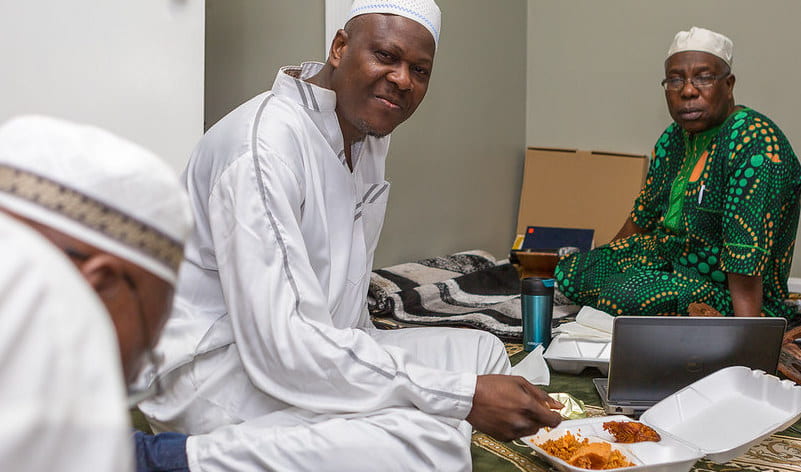In 2022, Boston’s Age Strong Commission awarded small grants to 16 nonprofit organizations working to build social connections for Boston’s older adults. For guidance in shaping the Creating Community and Reducing Social Isolation grants, the commission turned to Caitlin Coyle, PhD, director of the Center for Social and Demographic Research on Aging (CSDRA) at UMass Boston.
“Age Strong wanted to encourage local efforts to promote social connections among residents,” says Coyle. Programs funded by the Creating Connections grants range from in-person wellness classes to home visits for Chinese-speaking older adults, community gardening, a meal series for Nigerian Americans, a digital literacy program, and more.
Age Strong also partnered with CSDRA to evaluate the impact of the grants. Coyle and first-year doctoral student Kingsley Mbam have held two group workshops for all of the grantees and met individually with each organization to advise them on collecting program data.
“Caitlin and her team are the experts on evaluating programs like this,” says Age Strong Commission Director Alison Freeman. But determining the best way to measure progress on concepts such as loneliness and isolation is complicated, Coyle says. In 2019 she helped found the Massachusetts Taskforce to End Loneliness & Build Community to address similar issues across the state. “There are a number of complicating factors that make measurement challenging, for one there’s a spectrum of experiences of isolation and individual interpretations of social connections are obviously varied. Lastly, there is a lot of stigma around loneliness and isolation—making people less inclined to self-identify on a questionnaire,” Coyle says.
The Age Strong Commission focused on efforts to build social connections and promote positive social interaction. “No single intervention can solve isolation, it has to be as diverse as the people represented,” Coyle says. “One of the things we are seeing in these grant programs is that making space for people to engage and inviting them to participate is powerful. What that looks like is up to the members of the community. “
Africa Chop & Connect, the Nigerian program, for example, has offered participants a chance “to share meals and talk,” says Mbam. The concept seems simple enough on its face. But “Nigeria is a very diverse country,” and its people practice a wide range of religions, says Mbam, who grew up in Nigeria. He was especially impressed that the Nigerian participants were able to put aside their religious differences and share meals, sometimes in a mosque, sometimes in a church.
“Africa Chop & Connect owes its conception to an old Nigerian proverb that says ‘eating together is healing together.’ The idea is to bring seniors together over a meal and music in an atmosphere that fosters friendship and cultural connectedness while providing tips for staying healthy in an era of long COVID,” says Godwin Nnanna, president of the Nigerian American Multi-Service Association. “Our goal is to mitigate the effects of the long period of isolation due to COVID. For many participants, it has helped build bonds of friendship well beyond familiar zones. Some of the Christians confess they had never been to a mosque until they attended Chop & Connect in the mosque, and vice versa for the Muslims visiting a church.”
The researchers are also gaining greater understanding of the challenges that grassroots organizations face in developing, executing, and evaluating programs aimed at promoting social connections. “Some of the organizations are very new to this work, and others have been doing it for a while,” says Mbam. “Those who are new to offering such programs have struggled more to launch them.”
The researchers developed a measurement tool with sample questions each organization can use. The questions focus on community connection as the main outcome of the local programs. Participants are asked about their sense of connection on three levels: As a result of their participation, do they feel more connected to society as a whole? Do they feel more connected to their local neighborhood? And do they feel more connected to other individuals? Other open-ended qualitative questions attempt to draw out what about the program has been impactful.
Funding for the program came from unused social programming funds, due to the COVID pandemic. From 89 applications, the Age Strong team chose 16 organizations and awarded grants ranging from $12,000 to $27,000.
“We were shocked to see so many applications, and it was amazing to see the range of organizations applying,” Freeman says. Such a high level of interest “highlights the need for this,” she says. “These are organizations in the community, run by the community, so they really know what their communities need.”
Creating Connections grantees include:
- Boston Project Ministries
- Boston Public Housing Corporation
- Central Boston Elder Services
- Dorchester Bay Economic Development Corporation
- Little Brothers Friends of the Elderly/Boston
- Madison Park Development Corporation
- Maverick Landing Community Services
- Nigerian-American Multi-Service Association
- Operation P.E.A.C.E. Northeast
- Orchard Park Tenants Association/Saida’s Community Garden
- Somali Development Center
- The Urban Farming Institute of Boston
- Tzu Chi Foundation
- Urban Edge Housing Corporation
- Voice of the Tabernacle Multi Service Center
- Whittier Street Health Center Committee.


1 Pingback